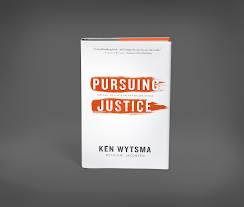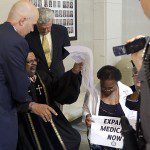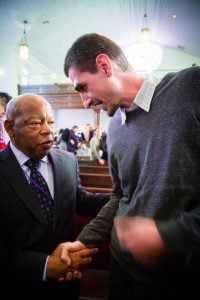 For over forty years, a minority movement in American evangelicalism stood strong and shouted loud that Jesus and justice cannot be separated–that justice is, in fact, at the center of Scripture and the very heart of God. The prophets of this movement never tired of reminding their more politically conservative brethren that over 2,000 verses in Scripture reference the poor. Jim Wallis, John Alexander, Ron Sider, Tony Campolo, John Perkins, and Tom Skinner preached those texts in pulpits and college chapels, at camp meetings and conferences across America. (David R. Swartz has recently chronicled this movement in a scholarly but accessible survey, The Moral Minority.) They built institutions around their message: Sojourners, CCDA, and Eastern University among them.
For over forty years, a minority movement in American evangelicalism stood strong and shouted loud that Jesus and justice cannot be separated–that justice is, in fact, at the center of Scripture and the very heart of God. The prophets of this movement never tired of reminding their more politically conservative brethren that over 2,000 verses in Scripture reference the poor. Jim Wallis, John Alexander, Ron Sider, Tony Campolo, John Perkins, and Tom Skinner preached those texts in pulpits and college chapels, at camp meetings and conferences across America. (David R. Swartz has recently chronicled this movement in a scholarly but accessible survey, The Moral Minority.) They built institutions around their message: Sojourners, CCDA, and Eastern University among them.
These justice advocates did not convince American evangelicalism that they were right on every policy point and justice issue. (They didn’t always agree with one another.) But like their forebears who had defined themselves “evangelical” as opposed to “fundamentalist,” the evangelical justice crowd outlasted their resistance. Justice won a place at the center of evangelical faith.
So next weekend, when Eastern University hosts The Justice Conference in Philadelphia, simulcasting at locations around the country, every evangelical missions organization and publication aimed at reaching folks under 40 will be present or paying attention. Even those who stay away from the conversation will be shaped by it.
Because justice has won. We cannot talk about a Jesus movement in America today without talking about justice.
But that hardly means the conversation is over. Because recognizing that justice is at the heart of God is not the same thing as understanding what it means to put it into practice. Saying that Jesus and justice are inseparable is a far cry from pursuing justice with all our heart, soul, mind and strength.
This is why I’m grateful for Ken Wytsma, founder of The Justice Conference, who has also just published his first book: Pursuing Justice: The Call to Live and Die for Bigger Things. Ken is committed to keeping evangelicalism’s justice conversation moving forward. And he’s humble enough to know he doesn’t have all the answers.
But I think it’s significant that both a book launch and a gathering meant to deepen the conversation are happening during Black History Month. Because, as grateful as I am for the prophets who’ve spent the last forty years convincing white evangelicals to care about justice, their message was never news to the black church tradition. From their earliest days of gathering at camp meetings and in brush arbors, black Christians in America have known that Jesus was on the side of freedom and that his Movement was toward justice.
If we are going to have any chance of learning to do justice, as Micah says the Lord requires, we who have inherited America’s original sin of racism must apprentice ourselves to the black church and drink deep from its wells of wisdom. It is not enough, I am convinced, for us to realize that the Bible has been talking about justice all along. It’s not enough to say the word. For terrible things have been done in the name of justice. And they will continue to be, even by well meaning people who are zealous to overcome their history of ignorance.
No, white evangelicals are not well suited to lead the justice conversation that we now need most. We would do better, it seems, to begin with repentance–to search our souls for the hidden wounds that racism has inflicted upon us. We would do well to listen to the stories of David Walker and Harriet Tubman, of Frederick Douglass and Sojourner Truth, of Ida B. Wells and A. Philip Randolph, of Septima Clark, Fannie Lou Hamer, Fred Shuttlesworth, and Martin Luther King. We would do well to learn from the example (and from the mistakes) of allies like William Lloyd Garrison and Angelina Grimke, Lillian Smith and Clarence Jordan, Dorothy Day and Ed King. For some Christians in America, Jesus and justice were never separable. What do their traditions have in common that ours has lacked?
I am a product of American evangelicalism, a student of our movement, and a grateful participant in this family of faith. The ways we talk about personal conversion make sense to me: we can only open ourselves to grace at that point when we realize we cannot fix ourselves. But white evangelicals have often been blind to the ways that social transformation also demands repentance.
Leaving justice out, we’ve missed a lot.
Maybe this new conversation about justice is an opportunity for us to learn from those we’ve too long ignored.











